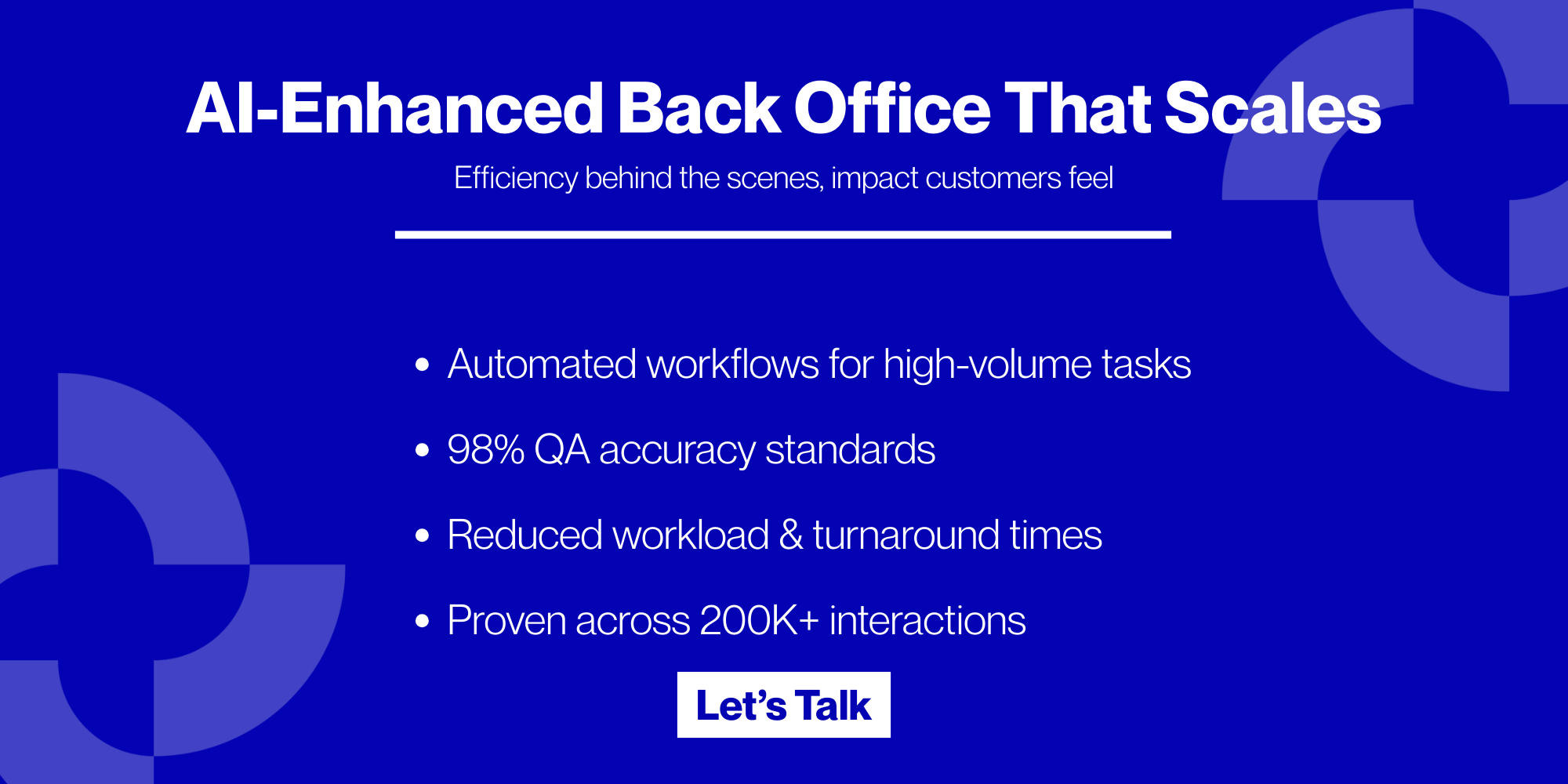Small businesses achieve cost savings alongside enhanced efficiency by delegating work to outside vendors through outsourcing. The outsourcing method presents two major dangers, which include quality management problems and security hazards. Business owners succeed in making strategic decisions when they recognize both the advantages and challenges of outsourcing toward their objectives. This includes understanding the pros and cons of an outsourced chief marketing officer, the pros and cons of an outsourced CMO, and even the outsourcing customer service pros and cons in detail.
For consumer brands and D2C companies in the U.S., U.K. & Australia, outsourcing is no longer just a cost-saving tool, it’s a growth strategy. Senior leaders in customer experience and customer support (VPs, Directors, and Senior Managers) are now adopting outsourcing to support operations, meet rising customer expectations and manage interactions.
We will now dive into the specific pros and cons of outsourcing and their effect on business development in 2025.
What is Outsourcing?

Outsourcing is hiring third-party employees to perform work that your company’s employees would normally perform. Organizations that choose outsourcing services pay external providers to complete tasks such as customer service functions, software development work, marketing tasks, and human resources operations to external providers to achieve higher efficiency combined with reduced expenses.
According to Deloitte’s 2023 research, cost reduction is the biggest reason 59% of businesses outsource, while 57% also opt outsourcing to handle core business operations, a trend which is expected to grow in 2025.
The Advantages of Outsourcing

1. Cost Savings
Hiring in-house staff requires organizations to pay extensive costs, including employee salaries, benefits, office rental expenses, and training and facility setup costs. By removing many overhead costs through outsourcing, businesses gain the advantage of better resource allocation.
For CX leaders managing support teams, outsourcing reduces costs tied to salaries, benefits, infrastructure and training while ensuring consistent service delivery across time zones.
2. Access to Global Talent
Companies through outsourcing, gain access to specialized professionals from across the globe. Startups get access to global talent through outsourcing, which extends to AI development, digital marketing, cybersecurity, and customer service capabilities. Customer experience leaders benefit from access to multilingual support agents, AI chatbot trainers and technical support roles that are hard to recruit in-house.
3. Faster Scalability
Business expansion requires additional resources and higher management costs. Outsourcing helps businesses scale faster by gaining quick, on-demand staffing flexibility that lets them change their operational size according to market requirements, especially relevant in 2025, when market demands shift rapidly.
For example: D2C brands face seasonal increase in customer inquiries during holidays. Outsourcing allows them to improve support capacity in weeks without heavy investments.
4. Focus on Core Business Functions
Organizations face the challenge of split workplace operations because essential activities absorb important time slots and organizational funds. Outsourcing HR together with IT support, payroll services, and data entry tasks enables organizations to dedicate their resources to product development, marketing activities, and customer interaction.
This is particularly valuable for CX executives, who wish to focus on improving Net Promoter Score (NPS), retention and customer lifetime value while outsourcing routine support.
5. 24/7 Operations & Increased Productivity
Businesses that outsource can run 24/7 operations through their use of staff spread across diverse time zones.
For consumer brands with global customers, offshore outsourcing provides 24/7 support, reducing wait times and improving customer satisfaction scores.
The Risks & Drawbacks of Outsourcing in 2025

Outsourcing comes with both advantages and risks and associated drawbacks. Businesses must understand these demerits of outsourcing as well as develop risk control plans before making decisions for strategic outsourcing.
1. Quality Control Issues
Organizations that outsource operations manage to cut costs and boost efficiency, but the quality of work might be affected.
This challenge is seen in industries who interact with customers, where poor communication or lack of empathy can impact customer loyalty.
2. Security & Data Privacy Risks
Outsourcing requires sharing sensitive business data with third-party vendors, which increases the risk of data breaches, unauthorized access, and compliance violations.
For companies handling customer financial data or personal information in regions like the U.S. and U.K., compliance with GDPR, HIPAA and CCPA becomes an important consideration when outsourcing customer service.
3. Hidden Costs & Dependency
Outsourcing often appears as a cost-effective solution, but hidden costs and vendor dependency can make it more expensive in the long run.
CX leaders should assess vendor contracts, as unexpected service fees and limited flexibility can prove to be more than initial cost savings.
4. Communication Barriers
Outsourcing often involves working with teams in different time zones, cultures, and languages, which can lead to miscommunication, delays, and frustration.
The key for CX managers is to establish clear communication guidelines and invest in collaboration tools like Slack or Zoom to maintain efficient customer interactions.
Final Thoughts
Outsourcing in 2025 has undeniable services that have its pros and cons. It not only offers cost savings and scalability opportunities but it also carries risks like quality control and security concerns. The key is to find the right balance—outsource non-core functions while keeping mission-critical operations in-house.
For consumer brands and D2C companies, in customer experience outsourcing works as a competitive advantage when implemented strategically. Whether it’s evaluating the pros and cons of outsourcing customer service, an outsourced CMO or back-office operations, the best strategy is to make outsourcing decisions with customer experience goals in mind.
FAQs On Pros and Cons of Outsourcing
1. Is outsourcing worth it for startups?
Yes, if done strategically. It helps reduce costs and provides access to skilled professionals without long-term commitments.
2. What are the most commonly outsourced business functions?
IT development, customer support, HR, marketing, finance, back office process outsourcing, and data entry are among the top outsourced services.
3. What industries benefit the most from outsourcing?
Tech, SaaS, healthcare, finance, and e-commerce often leverage outsourcing to scale operations.
4. How do I ensure quality when outsourcing?
Choose experienced vendors, set clear expectations, and establish KPIs to measure performance.
5. What’s the biggest disadvantage of outsourcing?
Loss of control over quality, security risks, and potential hidden costs.

